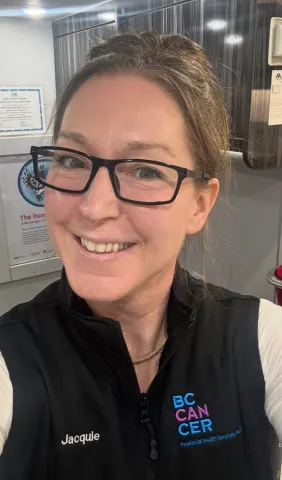
Mobile Mammographer Jacquie Heichert Brings Essential Care to Rural Communities

For nearly 13 years, Jacquie Heichert has been on the road, driving tens of thousands of kilometres across British Columbia to bring lifesaving breast cancer screening to rural and Indigenous communities. As a mobile mammographer with BC Cancer, she operates one of the province’s mobile screening units—massive, 30,000-pound trucks fully outfitted with diagnostic imaging equipment—delivering essential health care to areas where access to medical services is often scarce.
Growing up in the small town of New Denver, population 500, Jacquie understands firsthand the challenges of living in a remote community. “Everything you needed, whether it was a dentist or a specialist, you had to travel to it,” she recalls.
After high school, she moved to Calgary, working as a server before taking a leap and moving to Europe to teach English. But after three years abroad, she was looking for a career that would be both fulfilling and meaningful. That’s when she stumbled across medical imaging.
When she first learned about mobile mammography, it struck her as a potential game-changer.
“The idea that we could bring this service to each of these little towns instead of making them travel outside of their area, it just made sense.”
Jacquie and her colleagues do more than take images: they ensure that thousands of people across the province receive screening they might otherwise forgo. “We constantly hear from women who say, ‘if you didn’t come to our town, I wouldn’t have gotten this done’,” she says. Some of these same women have later returned to knock on the truck’s door, thanking the team for detecting their cancer early enough for professionals to treat it.
But Jacquie’s work often goes beyond patient care. Mobile mammographers are responsible for everything from driving and maintaining these massive vehicles to troubleshooting mechanical failures—often in harsh conditions.
“One day we’re screening patients, the next we’re hoisting a muffler in inclement weather or figuring out why a generator won’t start,” she explains. Unlike those working in stationary clinics, mobile mammographers are expected to be drivers and mechanics, on top of being highly skilled medical specialists. Additionally, mobile mammography requires staff to be on the road for two weeks followed by two weeks off, which means that they’re away from home a total of six months a year.

Despite the critical nature of their work, mobile mammographers are struggling. Chronic underfunding and a staffing shortage have put the program at risk. The team is supposed to have eight full-time staff to keep the program running efficiently. Today, there are only four. As a result, one of BC’s mobile screening trucks has already been shut down, limiting the number of communities that can be reached.
The biggest issue? Pay.
“We’re expected to do so much more than a stationary technologist but we’re paid the same,” Jacquie says. “Many of us that have been on the road for years are leaving to go and work in other places where you get paid more and you’re not gone two weeks at a time.”
But the impact of losing this program is clear: fewer mobile mammographers means fewer screenings, longer wait times, more travel required and thus delayed care, and higher risks for patients who depend on early detection.
“If we don’t have the staff or the trucks to get to these communities, people will go without screenings,” Jacquie warns. “And that means more late-stage cancer diagnoses that might have been preventable.”
Despite all of these challenges, Jacquie loves her job. She enjoys the people she works with and gets a lot of satisfaction out of serving hard-to-reach communities. But without proper investment, she worries about the future of the program.
“There needs to be appropriate incentives for people to do this work, whether it’s better wages, better trucks, or even a system where we aren’t also responsible for driving and maintaining the trucks ourselves,” she says. “Otherwise, I don’t know how much longer this service can last.”
Working with Jacquie and her colleagues, HSA has raised these concerns with the health authority, and the Ministry of Health is being asked for support. In the meantime, Jacquie and her team keep driving forward, ensuring that even the most remote communities in BC have access to the care they deserve. But without urgent action, this essential service—one that has already helped save countless lives—could disappear, leaving thousand without the screenings they rely on.